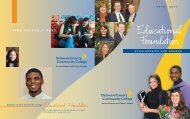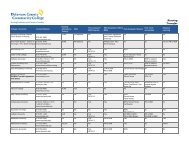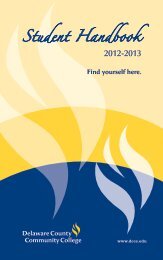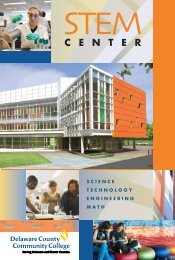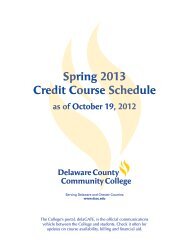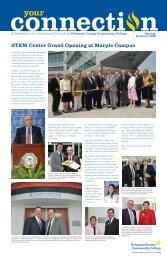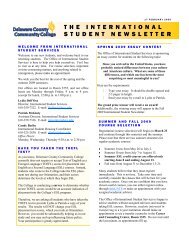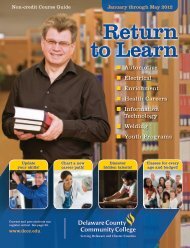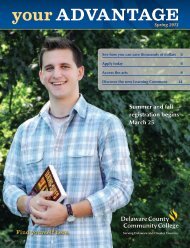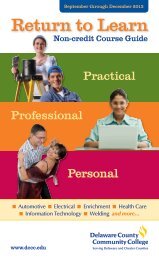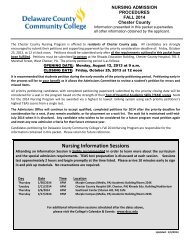2010 Catalog - Delaware County Community College
2010 Catalog - Delaware County Community College
2010 Catalog - Delaware County Community College
You also want an ePaper? Increase the reach of your titles
YUMPU automatically turns print PDFs into web optimized ePapers that Google loves.
COURSE DESCRIPTIONS 103<br />
• Apply basic and old-age makeup<br />
• Apply scars and bruises using makeup techniques<br />
learned in class<br />
• Demonstrate knowledge of period makeup, hair,<br />
and costumes<br />
• Design costumes for a specific play from concept to<br />
final design<br />
• Create makeup and hair design for specific play<br />
Prereq. ENG 050 and REA 050<br />
3 Credits 3 Weekly Lecture Hours<br />
DRA 130 Voice and Movement<br />
Special Studies<br />
Voice and Movement is designed to introduce students to<br />
major vocal and movement techniques and practices used<br />
by professionals such as actors to maximize their effectiveness<br />
as public speakers and to create vibrant, multi-faceted<br />
characters for stage and film. This course teaches the<br />
inner workings of the human voice and the processes of<br />
articulation used to speak and pronounce sounds, and will<br />
emphasize the effective use of such techniques as proper<br />
breathing, stress, inflection, vocal quality, focus, rate of<br />
speech and pace, and others. Students will also learn<br />
various movement techniques such as gesture, mime,<br />
Alexander technique, Viewpoints, and the Suzuki method.<br />
The class will investigate the body/voice connection, and<br />
how these techniques work together in public speaking<br />
and in the creation of a stage or film character.<br />
Upon successful completion of this course, students<br />
should be able to:<br />
• Describe the physical actions and anatomical parts of the<br />
body used to produce sound and speech.<br />
• Demonstrate in performance a knowledge of the different<br />
styles and methods of physical movement used in the art<br />
of speaking and acting.<br />
• Apply tools and concepts learned to create an effective<br />
public speaking voice.<br />
• Analyze a script or speech to identify rhetorical devices<br />
and rhythms of speech.<br />
• Create a physical and vocal description of a theatrical<br />
character based on analysis of a script.<br />
• Apply methods and techniques learned to manipulate the<br />
voice and physicality of the body in the creation and<br />
performance of a theatrical character.<br />
• Work within a group and demonstrate an awareness<br />
of ensemble dynamics and cooperation.<br />
Prereq. ENG 050 and REA 050<br />
3 Credits 3 Weekly Lecture Hours<br />
(ECE) Early Childhood Education<br />
ECE 100<br />
Principles of Early Childhood<br />
Education<br />
This course examines the historical development of<br />
early-childhood education and the concerns, principles,<br />
practices and problems of organization and teaching in<br />
early-childhood education facilities.To assist students in<br />
gaining this knowledge in a well-organized manner, the<br />
course is structured into areas of competence.<br />
Upon successful completion of this course, students<br />
should be able to:<br />
• Demonstrate knowledge of the variety of formal schools<br />
and centers for young children.<br />
• Demonstrate the knowledge necessary for the successful<br />
operations of schools and centers for young children.<br />
• Demonstrate an appreciation of the importance of the<br />
early years of the child and the importance of relating<br />
to young children as persons.<br />
• Demonstrate knowledge and understanding of the<br />
importance of working with parents as partners.<br />
3 Credits 3 Weekly Lecture Hours<br />
ECE 110 Methods and Materials In<br />
Early Childhood Education I<br />
This course deals with the methods and materials<br />
available for teaching the knowledge, skills and attitudes<br />
normally found in integrated Early-Childhood Education<br />
curricula. It emphasizes a holistic approach to Early-<br />
Childhood Education.<br />
Upon successful completion of this course, students<br />
should be able to:<br />
• Identify materials and methods that will effectively<br />
foster the physical, social and emotional development<br />
of young children.<br />
• Evaluate the appropriateness of materials and methods<br />
employed in creative and craft activities in an earlychildhood<br />
education curriculum.<br />
• Characterize methods and materials that will effectively<br />
promote a positive attitude toward language arts, natural<br />
and physical science, social sciences and numbers<br />
operations in young children.<br />
3 Credits 3 Weekly Lecture Hours<br />
ECE 111 Methods and Materials In<br />
Early Childhood Education II<br />
This course deals with the methods and materials<br />
available for teaching the knowledge, skills and attitudes<br />
normally found in integrated Early-Childhood Education<br />
curricula. It emphasizes a holistic approach to Early-<br />
Childhood Education.<br />
Upon successful completion of this course, students<br />
should be able to:<br />
• Design an early-childhood education environment that<br />
effectively fosters the development of social, emotional,<br />
moral, physical and mental abilities in young children.<br />
• Create age-appropriate arts and crafts activities that<br />
effectively promote the development of young children.<br />
• Design a series of lessons and activities that effectively<br />
promote a positive attitude toward language arts, natural<br />
and physical science, social sciences and numbers<br />
operations in young children.<br />
Prereq. ECE 110<br />
3 Credits 3 Weekly Lecture Hours<br />
ECE 112 Developing a Professional<br />
Portfolio and Resource File for ECE<br />
This course will prepare the student to be able to develop<br />
a professional portfolio that will demonstrate their<br />
competency in teaching in the field of Early Childhood<br />
Education. Students will gain knowledge of the how to<br />
create and maintain their portfolio and how to use it in<br />
their careers. This course will also prepare the student for<br />
assessment by the Council for Professional Recognition for<br />
the Child Development Associate Credential by including<br />
requirements for the Professional Resource File.<br />
Upon successful completion of this course, students<br />
should be able to:<br />
• Identify the purpose of developing a professional<br />
portfolio.<br />
• Identify the key components of a professional portfolio<br />
• Develop artifacts to demonstrate teaching competency<br />
• Identify and compile resources to support<br />
teaching activities<br />
• Develop the Child Development Associate Credential<br />
Professional Resource File.<br />
• Understand the importance of lifelong learning.<br />
• Develop a portfolio utilizing key components, artifacts for<br />
inclusion, and resources necessary to demonstrate<br />
professional competency.<br />
Prereq. ECE 100<br />
1 Credit<br />
ECE 120 Early Childhood Education<br />
Laboratory I<br />
A student's first laboratory experience will focus on<br />
the development of interpersonal relationship skills and<br />
qualities necessary to become a good teacher of young<br />
children. To assist students with gaining this knowledge in<br />
a well-organized manner, the course is structured into 10<br />
areas of competence.<br />
Upon successful completion of the course, students<br />
should be able to:<br />
• Demonstrate an ability to quickly gain the confidence of<br />
the child, the parent and ther teachers in the students<br />
ability to provide a meaningful educational experience in<br />
a friendly climate.<br />
• Exhibit social adequacy in a professional setting.<br />
• Communicate effectively with children, teachers, and parents.<br />
• Exhibit a professional attitude toward assigned<br />
responsibilities.<br />
4 Credits 1 Weekly Lecture Hours<br />
6 Weekly Laboratory Hours<br />
ECE 121 Early Childhood Education<br />
Laboratory II<br />
The second semester of the laboratory experience focuses<br />
on development of actual teaching skills. To assist students<br />
with gaining this knowledge in a well-organized manner,<br />
the course is structured into five areas of competence.<br />
Upon successful completion of this course, students<br />
should be able to:<br />
• Apply child development theory in an early-childhood<br />
education teaching/learning situation.<br />
• Plan, organize, implement and evaluate learning<br />
experiences for young children.<br />
• Conduct all other classroom administrative<br />
responsibilities necessary for the development of<br />
young children.<br />
Prereq. ECE 100,ECE 110,ECE 130<br />
4 Credits 1 Weekly Lecture Hours<br />
6 Weekly Laboratory Hours<br />
ECE 130<br />
Early Childhood Development<br />
This course examines the physical, intellectual, emotional<br />
and social development of the child from prenatal life<br />
through early-childhood years. To assist students in gaining<br />
this knowledge in a well-organized manner, the course is<br />
structured into six areas of competence.<br />
Upon successful completion of the course, students<br />
should be able to:<br />
• Detail the significance of child development to<br />
the educator.<br />
• Assess all major theories of development.<br />
• Sight the determinants of development.<br />
• Trace the development in the beginning of life. I<br />
• dentify the development through the first two years.<br />
• Depict early-childhood development ages two to six.<br />
3 Credits 3 Weekly Lecture Hours<br />
ECE 131 Observing and Recording the<br />
Behavior of the Young Child<br />
This course is designed to increase objectivity and<br />
proficiency in reporting and assessing child behavior. The<br />
student observes and interprets the behavior of young<br />
children and writes analyses of these observations.<br />
Upon successful completion of this course, students<br />
should be able to:<br />
• Analyze the various ways children express themselves.<br />
• Explicate the uses of observation and recording in<br />
early-childhood education.



